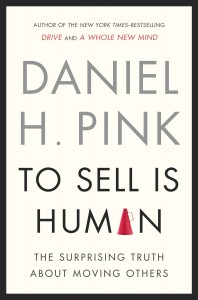Has Daniel Pink Gone Too Far?
 The premise of Daniel Pink’s new book, To Sell Is Human
The premise of Daniel Pink’s new book, To Sell Is Human, is that almost everyone sells. Regardless of whether you are a quota-carrying salesperson, you need to influence and persuade others to be effective in what you do. I’ve said the same thing many times in my blog, but it’s also time to throw a note of caution into the discussion.
We need a reminder that there’s a huge difference between selling as a part of what you do on a regular basis, and selling as a profession. When your ability to put food on the table depends on your performance of a specific skill, it requires a huge qualitative difference in how you approach that skill.
To illustrate my point, let’s look at an analogy. In knowledge work, everyone also writes. It may only be emails, or it may be longer and more elaborate reports, but the ability to write definitely makes a difference in your career progression. But writing as part of your job does not make you a writer—certainly not one who could be mentioned in the same sentence as a Daniel Pink.
It’s like the difference between a churchgoer and the pastor, or the difference between coaching your kid’s T-ball team and being a professional coach. To use a cliché, it’s like the difference between the chicken and the pig when it comes to ham and eggs. One is involved and the other is committed.
Professional salespeople are committed because they get measured and paid primarily for their success at selling—they can get fired for not accomplishing their primary task. If an engineer has trouble selling his or her ideas, their career progression might be slowed, but they won’t get fired. If a health care worker is ineffective at selling a treatment plan to a patient (one of Pink’s favorite examples), the patient suffers the consequences. If a salesperson is unable to sell something the customer needs, the customer may suffer, but the salesperson is going to feel the immediate consequences.
Professionals have to produce. When you make a living by doing something, you have to do it even when you don’t feel like it, like a shark that has to keep swimming. That’s why professional salespeople have to sell even when they don’t want to. They also know the drudgery of “dialing for dollars”, and of having to be on at all times, in a way that amateurs don’t. In the same vein, professional writers know that they have to write even when they don’t feel like it. Pink, for example, holds himself to a daily word count, because no one pays you for words you don’t write.
Because of this, the bar for sales performance is much higher, and the commitment to the craft and skill is correspondingly in a different league entirely.
Why does this matter? Because if selling is to be taken seriously as a profession, it’s critical to dispel the myth that anyone with no training or skill can be a successful salesperson, and the related idea that sales is just a refuge for those who couldn’t handle the more difficult subjects in college. Let’s keep in mind that a professional salesperson (especially in the B2B arena) has to become proficient in a wide range of general disciplines, including complex technologies embedded in their product, general business and industry acumen, psychology, persuasive expression (including writing—although it doesn’t make them writers). Added to those general disciplines are skills directly related to sales, such as questions, dealing with objections, sales strategies and processes, connecting features to benefits, and territory management, to name just a few. They have to thoroughly learn these skills (and keep learning, because things are changing so fast), because they are committed.
I really like To Sell Is Human, partially because it does a great job in dispelling harmful sales myths, especially the one that selling is somehow slimy or distasteful. But I am afraid that taking too literally his idea that everyone is in sales risks propagating another harmful myth.




Jack,
I have no hard data. It is more a personal opinion based on observations.
Here are a few of them:
Take the small numbers of CEOs having reached their position through the rank of sales. Bill McDermott and Marc Benioff are the only two that come readily to my mind.
The short tenure of VPs of Sales seems to me an indicator that the selection process might be broken. Typical phenomenon you often see when revenue becomes flat, the current VP of sales is fired and a new person coming from the outside is assigned to the role. This person usually comes with the track record of having stewarded strong sales growth at his/her former employer. Stewarding sales growth does though take different skills than reigniting growth or at least preventing revenues from further decline. If it were not tenures would be longer.
The pressure put on the sales forces leading to dysfunctional behavior like bloating the pipeline with dreams just because pipeline coverage is the only ratio measured and cared about by the top brass.
Look how often you see articles on sales in HBR. It is mostly concentrated on a special issue of the magazine about every 5 years usually in the vacation period when it might be harder to come by other content.
Again, just personal observations and interpretations, not hard data that make me believe that very often there is a disconnect between CEOs and their sales forces. Maybe it could be an interesting topic for a study to get more facts.
Good points, Christian. I suppose it’s just a fact of life that we tend to remember the bad experiences and ignore the good. All of us come into contact with good salespeople but the bad ones stick in our minds. I’m intrigued with your point about too few CEOs caring about their sales force: is that a personal observation, or do you have some data to support it? I ask the question, not in a challenging way, but out of curiosity, because it sounds like a great topic for a future article.
@Jack I like the book for the same reason you do. I think it is important that the sales profession gets a better image. I actually consider whether I make the book mandatory reading for Professional Services people when they come up through the ranks and have to start selling in the professional sense of the term. Engineers are also a target audience for this book.
@Richard I know we B2B sales folks have a better opinion of ourselves than the sleazy image Daniel Pink tries to dispel in his book. I think though the book is very necessary. In any workshop I hold with B2B sales people or managers, I ask the question “Please raise your hand if you like salespeople”. Very often, mine is the only hand that is up. Does that mean these people in the workshop do not like their own profession? We have this somewhat sleaze image of sales people programmed into ourselves. Why? To me, it seems that we associate bad examples of how we have been sold to faster and stronger to the term “salesperson” , than how we are different from this ugly picture. This is also a reason why to few CEOs really care about their sales force. They do not want to understand how it works because of the bad image they have about it, even though they know that the sale force is what brings in the revenue.
If selling is part of the sales process and if we believe sales is the transference of emotions, then everyone sells because human beings are emotional creatures first and foremost thanks to the amygdala. How well they sell now that is an entirely different animal.
Richard, I would agree that very few people in our circles would think so, but judging from the sheer number of sales and the breadth of experience of the readers (which I have some insight about because I was asked to join Dan’s pre-launch team), it doesn’t hurt to spread the word. (Kind of like getting a flu shot every year because the new strains pop up all the time.)
Jack – just a note or two. When it comes to B2B type of sales which is the area I have some experience I really don’ t think anyone I have encountered thinks that this type of selling is easy or low skilled – so there is no myth to dispeal. LIkewise I think that the thinking that sales is “slimy” was dead decades ago – so again no myth to dispeal.
As Kelly pointed out persuasion in every day life has almost nothing to do with professional selling. Yes, sales person must be good at asking questions and folks out in the world also ask questions – but there is not much of a story line to develop around this often repeated connection.
Jack, “everyone” is an enormous encompassing word and word types I try to avoid. A few years ago, I spoke to a group of CEOs, entrepreneurs, professionals, doctors, lawyers, etc. on this theme tailored to them. Do I think “everyone” sells something? Absolutely not and I agree with you.
Selling successfully requires a broad skill set spanning many disciplines from psychology to business and product knowledge with deep understanding of buying sales processes.
Daniel Pink’s book displays excellent marketing skills. The absence of qualifying what level of sales he is referring to is the problem. His subtitle implies a narrower theme. Not having read the book leaves me at a disadvantage. From your take, it sounds as though he is paralleling persuasion with sales. They may have common roots in rhetoric, but persuasion and selling are not twins.
I’d like to think that what I spent four decades learning and honing cannot be found in a book and done with great success by “anyone.”
Regards,
Gary
Excellent observation and commentary, Jack. Persuasion and influence are not exactly the same thing as the profession of selling – and its many demands.
KR